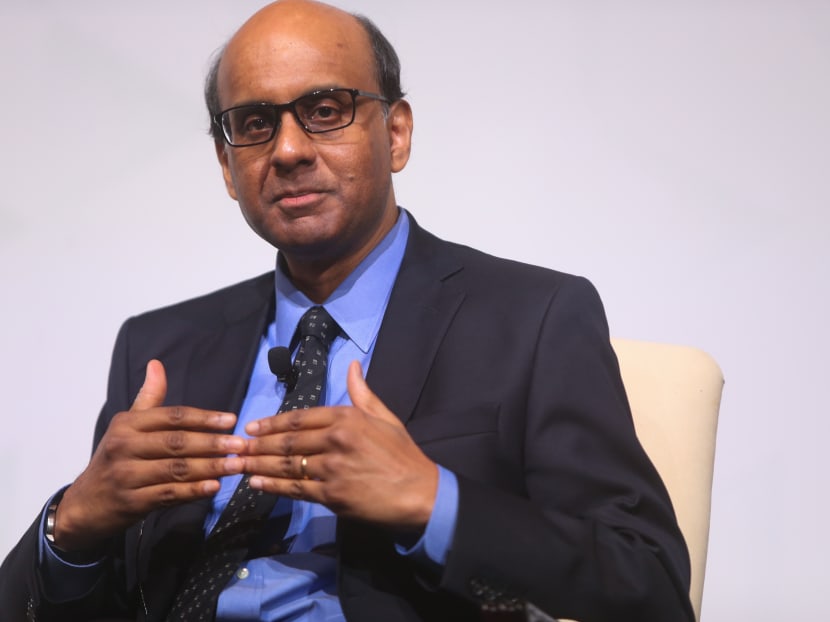Tharman warns on American retreat from Asia
SINGAPORE — Failure to ratify the Trans-Pacific Partnership trade deal would be a “major setback” for the standing of the US in Asia, Deputy Prime Minister Tharman Shanmugaratnam has said, underlining concerns in the region that America’s Pacific pivot is in trouble.
SINGAPORE — Failure to ratify the Trans-Pacific Partnership trade deal would be a “major setback” for the standing of the US in Asia, Deputy Prime Minister Tharman Shanmugaratnam has said, underlining concerns in the region that America’s Pacific pivot is in trouble.
America’s Asian allies fear the collapse of the deal will become an emblem of a US retreat from the Pacific.
Anxiety over China’s mounting influence in Asia was compounded last week as the Philippine president Rodrigo Duterte announced his country’s “separation” from the US and warmer relations with Beijing.
The 12-nation Pacific Rim trade pact has become a lightning rod for discontent over globalisation and a key issue in the US election, with both Mrs Hillary Clinton and Mr Donald Trump opposed to the deal. Chances of the trade deal receiving US congressional approval are now slim.
Mr Tharman said: “TPP is not just about direct economic benefits. It’s about a reputation for openness and wanting to engage and deepen relationships for two-way benefit.”
In a sign of the heightened concern in Asia over this year’s electoral contest in the US, he added: “Calmer minds tend to prevail after the elections. This time, we can’t be so sure.”
Singapore, a small economy that relies on external trade, is one of four original members of the Pacific trade grouping which led to the TPP deal. Prime Minister Lee Hsien Loong has described the TPP as a “litmus test” for US credibility in the region.
Mr Tharman warned of a failure of nerve from leaders in advanced economies, citing Brexit as an example of an “accidental outcome” of a democratic process. Democracy, he added, “is not having a great run”.
“The populism of the left and right is getting stronger and, most dangerously, the parties of the middle are chasing the shadows of the populist extremes,” he said in an interview with the Financial Times. “The leadership that used to occupy the middle is now having to talk the language of the extremes in order to get re-elected.”
Mr Tharman, a member of the governing People’s Action party and deputy premier since 2011, described the Singapore ruling party’s firm grip on power as an advantage, allowing the city-state to plan for the future.
The PAP, founded by Singapore’s transformational prime minister Lee Kuan Yew, strengthened its hold on power last year in the country’s most fiercely contested general election in five decades of independence.
Mr Tharman said: “Singapore’s got something going for it. In most countries, you don’t know who’s going to win the next election, you don’t know who the leaders are going to be a few years down the road, and they are often people coming straight into government without previous experience.
“We’ve got a situation where at least for now, I know that the ruling party can win the next elections.”
The deputy prime minister said the US had failed to make “aggressive enough” efforts to help those left behind by technological change and global competition.
“No one can blame technology, it’s just not fashionable, so you blame globalisation because it’s about another country or about the global elite. And it takes attention away from where the light should really be shone — which is on your domestic policies,” Mr Tharman said.
Mr Tharman is popular with Singapore voters, fuelling persistent speculation that he may succeed Mr Lee, a move which would make him the city-state’s first non-Chinese prime minister. However, he recently ruled himself out of the race to lead the country, telling reporters: “I’m not the man to be PM.”
Mr Tharman, who is also chairman of the Monetary Authority of Singapore, admitted that Singapore needed to strengthen its anti-money-laundering regime as flows of illicit funds become more complex.
“We have never been viewed as having our eye off this ball, but we feel we have to up our game. We feel we have to up our game as all regulators should,” the deputy prime minister said.
The MAS has carried out a series of disciplinary actions this year over fund flows associated with Malaysia’s 1MDB state investment fund. These include ordering an Abu Dhabi-owned private bank, Falcon, to cease operations in Singapore and fining UBS and DBS. Singapore is also taking steps to consolidate its system for combating money-laundering, creating a dedicated unit for the task.
Mr Tharman said: “We’ve got to find ways in which we share information among regulators to try to decipher patterns. I say this not just about this particular episode, but about anything that comes in future.” FINANCIAL TIMES







